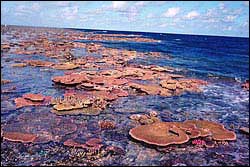Is pollution causing regional coral extinctions?
Since the 1980s, researchers have hypothesized that nutrient levels rather than temperature are the main factor controlling the latitudinal bounds of coral reefs, but the issue remains controversial. New results from an extensive survey of reefs in South Florida by a Harbor Branch Oceanographic Institution research team strongly support this hypothesis. The research suggests that, by supporting blooms of harmful seaweed, increasing
Absence of sharks from abyssal regions of the world’s oceans
Marine scientists have discovered that the deepest oceans of the world would appear to be shark free. In a paper published today, an international team of researchers, led by the University of Aberdeen, reveal that sharks have failed to colonise at depths greater than 3,000 metres.
Sharks occur throughout the world’s oceans and it had been hoped that as man explores deeper into the abyss and beyond th
Using DNA analysis, MIT researchers and colleagues have gained new insight into how marine microbes thrive and survive at different depths of the ocean.
“Microbes are the central processors of matter and energy in almost every ecosystem imaginable – especially so in the sea,” said MIT Professor Ed DeLong, who led the work. Thousands of different types of microbes, the world’s smallest creatures, inhabit every cubic centimeter of seawater. They have huge effects on ocean che

Atlantic expeditions uncover secret sex life of deep-sea nomads
For centuries scientists have thought of deep-sea pelagic fish as nomadic wanderers, in part because information about them was so limited. However, new results from the ongoing Mid-Atlantic Ridge Ecosystems program (MAR-ECO), a Sloan Foundation-sponsored component of the Census of Marine Life, have revealed that these fishes may in fact be gathering at features such as ridges or seamounts to spawn. The research has im
Increased carbon dioxide emissions are rapidly making the world’s oceans more acidic and, if unabated, could cause a mass extinction of marine life similar to one that occurred 65 million years ago when the dinosaurs disappeared. Ken Caldeira of the Carnegie Institution’s Department of Global Ecology will present this research at the AGU/ASLO Ocean Sciences meeting in Honolulu, HI on Monday, Feb 20.
Caldeira’s computer models have predicted that the oceans will become far more

Researcher outlines coral’s future in an increasingly acidic ocean
The ocean is getting more and more acidic, and that’s bad news for coral reefs. That’s the word from University of Miami Rosenstiel School’s Dr. Christopher Langdon who will speak on “Possible Consequences of Increasing Atmospheric CO2 on Coral Reef Ecosystems,” Monday, Feb. 20 at 3 p.m. HST (8 p.m. EST) in Honolulu at the American Geophysical Union’s 2006 Ocean Sciences Meeting.
“